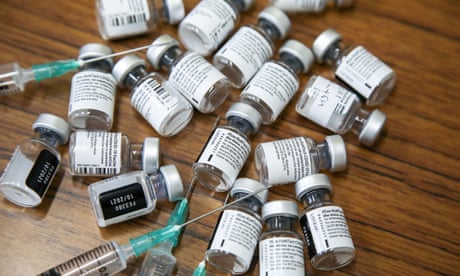Can a child be vaccinated without parental consent?
Thu 8:30 pm +01:00, 16 Sep 2021 5The guidelines say vaccinations for children aged 12 to 15 will be administered by School Age Immunisation Service (SAIS) teams that already carry out flu and human papillomavirus (HPV) vaccinations in England. The role of schools will be limited to providing a site and distributing information and consent forms to pupils and parents.
In cases where parents withhold consent but the child wants to go ahead, the guidelines say the vaccination teams will determine if the child is able to make an informed decision – known as Gillick competence – and “make every effort to contact a parent to check before they proceed”.

“If a parent objects to their child being vaccinated but the child wants to be vaccinated and is judged to be Gillick competent, the healthcare professional will try to reach agreement between the parent and child. However, the parent cannot overrule the decision of a Gillick competent child,” the guidelines state. In that scenario the child will be vaccinated.
In cases where parents refuse consent and the child is not deemed to be Gillick competent or does not want to be vaccinated, the guidelines from the UK health security agency say a vaccination will not be given.
Gillick competency applies mainly to medical advice but it is also used by practitioners in other settings. For example, if a child or young person:
- would like to have therapeutic support but doesn’t want their parents or carers to know about it
- is seeking confidential support for substance misuse
- has strong wishes about their future living arrangements which may conflict with their parents’ or carers’ views.
Medical professionals need to consider Gillick competency if a young person under the age of 16 wishes to receive treatment without their parents’ or carers’ consent or, in some cases, knowledge.
If the young person has informed their parents of the treatment they wish to receive but their parents do not agree with their decision, treatment can still proceed if the child has been assessed as Gillick competent.
There is specific guidance for medical professionals on using Gillick competence – see case history and legislation.
Guardian extract.
Assessing Gillick competence
There is no set of defined questions to assess Gillick competency. Professionals need to consider several things when assessing a child’s capacity to consent, including:
- the child’s age, maturity and mental capacity
- their understanding of the issue and what it involves – including advantages, disadvantages and potential long-term impact
- their understanding of the risks, implications and consequences that may arise from their decision
- how well they understand any advice or information they have been given
- their understanding of any alternative options, if available
- their ability to explain a rationale around their reasoning and decision making.
Remember that consent is not valid if a young person is being pressured or influenced by someone else.
Children’s capacity to consent may be affected by different factors, for example stress, mental health conditions and the complexities of the decision they are making. The same child may be considered Gillick competent to make one decision but not competent to make a different decision.
If you don’t think a child is Gillick competent or there are inconsistencies in their understanding, you should seek consent from their parents or carers before proceeding.
In complex medical cases, such as those involving disagreements about treatment, you may wish to seek the opinion of a colleague about a child’s capacity to consent (Care Quality Commission, 2019).
Young people also have the right to seek a second opinion from another medical professional (General Medical Council, 2020).
Refusal of medical treatment
Gillick competency can be used when young people wish to refuse medical treatment.
However, if a young person refuses treatment which may lead to their death or severe permanent harm, their decision can be overruled. More information about this is available in the guidance for medical professionals in each UK nation – see case history and legislation.
Child protection concerns
The child’s safety and wellbeing is paramount.
When you are assessing Gillick competency if you have any concerns about the safety of the young person you should check whether previous child protection concerns have been raised, and explore any factors that could put them at risk of abuse.
You must always share child protection concerns with the relevant agencies, even if this goes against a child’s wishes.
> Find out more about recognising and responding to abuse











This policy takes control over taking the vaxx away from the parents and hands it to Bill Gates, because if they’ve denied the parents the ability to say no then they’re not going to let the kids say no. For the establishment it will be better to get the kids to agree to being vaxxed rather than hold them down and force the jab in, but the pressure to comply will be relentless. No matter how headstrong a kid might be, they’re not mature enough to hold out ’til the end come what may. Also, it might be used as propaganda by the establishment to say the kids mostly wanted the vaxx, while so many of their parents would have risked their lives by denying the vaxx to them.
Kids should not sign the consent forms one way or the other. They should not speak to the invading forces who are coming into their schools. They are under no obligation to do so. Just walk. And tell the school that they are being pressured and their parents will bring legal action. Otherwise silence.
Wouldn’t surprise me at all if one of the national societies for children set up one of their ‘helplines’ … for the children of course.
Yeah Emm, that Rancid woman.
Yep. They’ll be salivating ian.